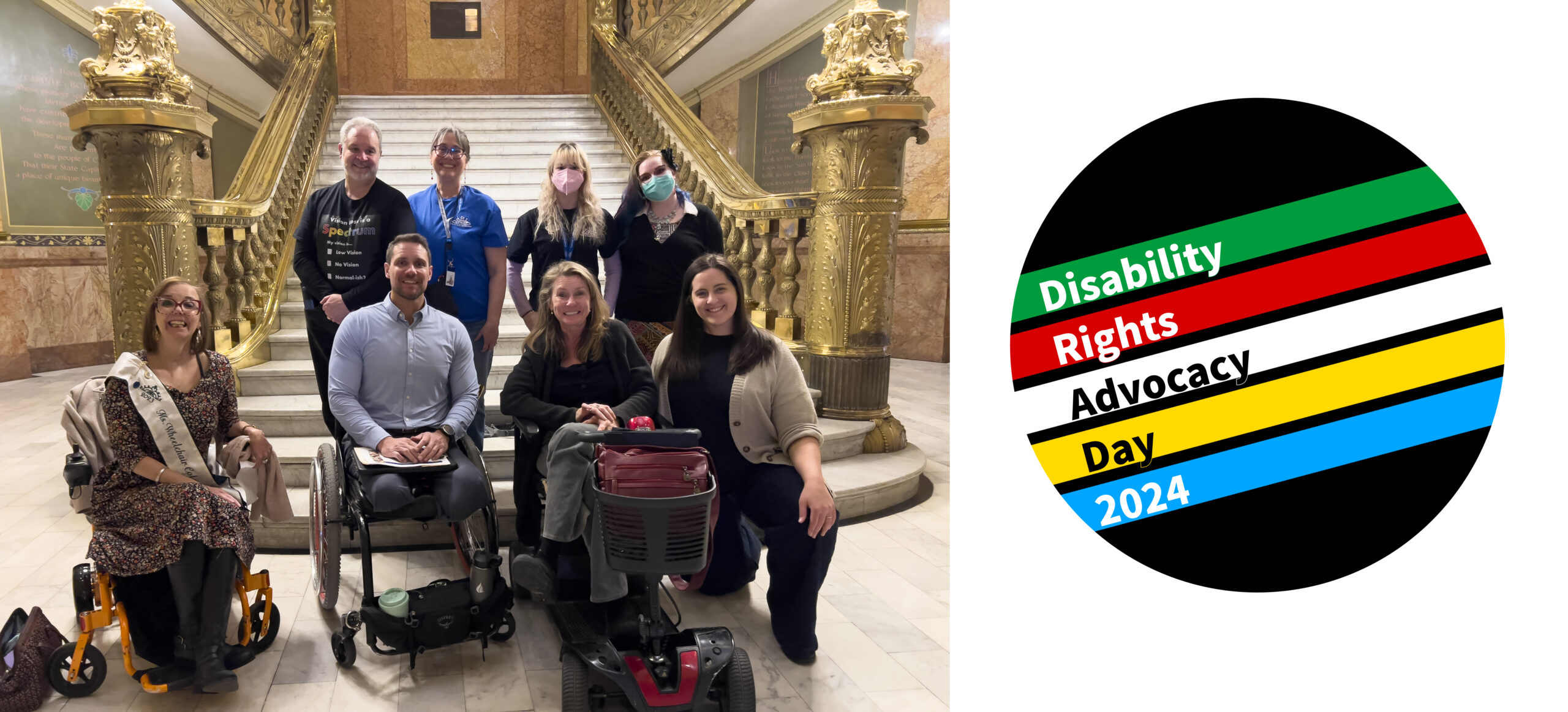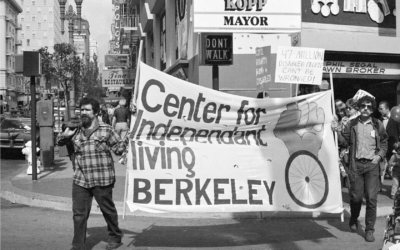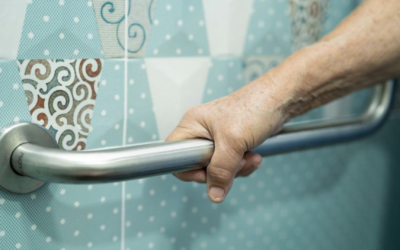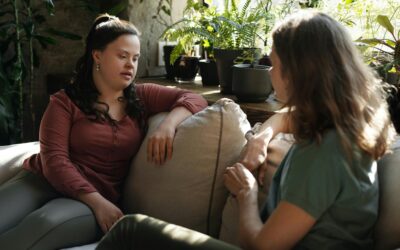Image description: Members of the staff of CPWD and consumers stand at the foot of the stairs inside the rotunda of the Colorado State Capitol. To the right of the image is the logo for Disability Rights Advocacy Day.
March 7, 2024 marked Disability Rights Advocacy Day (DRAD). More than 150 people with disabilities or part of the Independent Living Movement joined lawmakers and other public representatives at the Capitol to support pro-disability bills and laws, share personal experiences, and offer commentary and feedback on current barriers to accessibility and other issues. The event was also live streamed. DRAD is an important advocacy action, as it brings in-person sharing and representation of disability issues and rights to congresspeople and other lawmakers.
“The goal is to bring awareness and visibility of people with disabilities to share our voice and lived experiences at the Capitol, where policy and laws are made,” said Craig Towler, Community Organizer at CPWD. “Further, the event focuses on how our experiences – particularly related to challenges and barriers to accessibility – need to be reflected in policy changes,”
Barriers to Accessibility
Barriers to accessibility are rampant in modern society. In many public and private buildings and other places, people who use wheelchairs or other mobility devices either have a very difficult time accessing and navigating or cannot access them at all. Pointedly, the Capitol is no exception. It has one accessible entrance, which had a huge line on DRAD as people with disabilities lined up to get inside. Once inside the building, there are only two elevators that can only hold up to about 10 people.
The offices and main meeting rooms are often on different floors or in different parts of the building, and there is only one accessible bathroom – in the basement. To get there after a meeting with a lawmaker on the 3rd floor requires a 20-30 minute journey through hallways and down the elevator. Another barrier is accessing lawmakers in session. Typically, a meeting request card is given to a Sergeant at Arms, who then walks into one of the chambers to deliver the request to the lawmaker. However, the Sargent at Arms post is at the top of a flight of stairs, and completely inaccessible to people with disabilities who use wheelchairs or mobility devices.
This isn’t to critique the Capitol or Colorado Congress, but just to point out that even at the highest level of governance in our state, inaccessibility continues to be an issue. If this is in any way representative of most buildings and places in Colorado, there remains a lot of work to do to increase accessibility, and therefore equity, for people with disabilities.
“Just navigating into and through the building was challenging,” reflected Towler. “The building is filled with barriers to accessibility, which not only reflects barriers to mobility accessibility, but also reflects built in barriers to accessing and speaking to our representatives as well.”
During DRAD, a handful of bills were on the table for discussion, some addressing this very issue of accessibility as well as other important equity and equality issues.
Bills up for Consideration
Fifteen bills were discussed at various lengths and capacities on March 7. Below is a list of those bills followed by a discussion of some relevant ones that have the support of CPWD and ACCIL (Association of Colorado Centers for Independent Living).
Bills discussed:
- HB24 – 1167 – Prohibit Student Seclusion
- HB24 – 1115 – Prescription Drug Label Accessibility
- HB24 – 1168 – Equal Access to Public Meetings
- HB24 – 1161 – Motor Vehicle Access Individuals with Disabilities
- HB24 – 1165 – Denver Airport Accessibility
- SB24 – 136 – Uniform Guardianship and Conservatorship
- HB24 – 1318 – Modify Rental Premises Person with Disability
- HB24 – 1067 – Ballot Access for Candidates with Disability
- HB24 – 1063 – Address Abbreviated School Days
- HB24 – 1098 – Cause Required for Eviction of Residential Tenant
- HB24 – 1066 – Prevent Workplace Violence in Healthcare Settings
- HB24 – 1033 – Emergency Management Plan Individuals with Animals
- SB25 – 065 – Mobile Electronic Devices and Motor Vehicle
- HB24 -1360 – Colorado Disability Opportunity Office
While all the bills are important, some of the ones that were discussed in detail that day include:
HB24 – 1033 – Emergency Management Plan Individuals with Animals
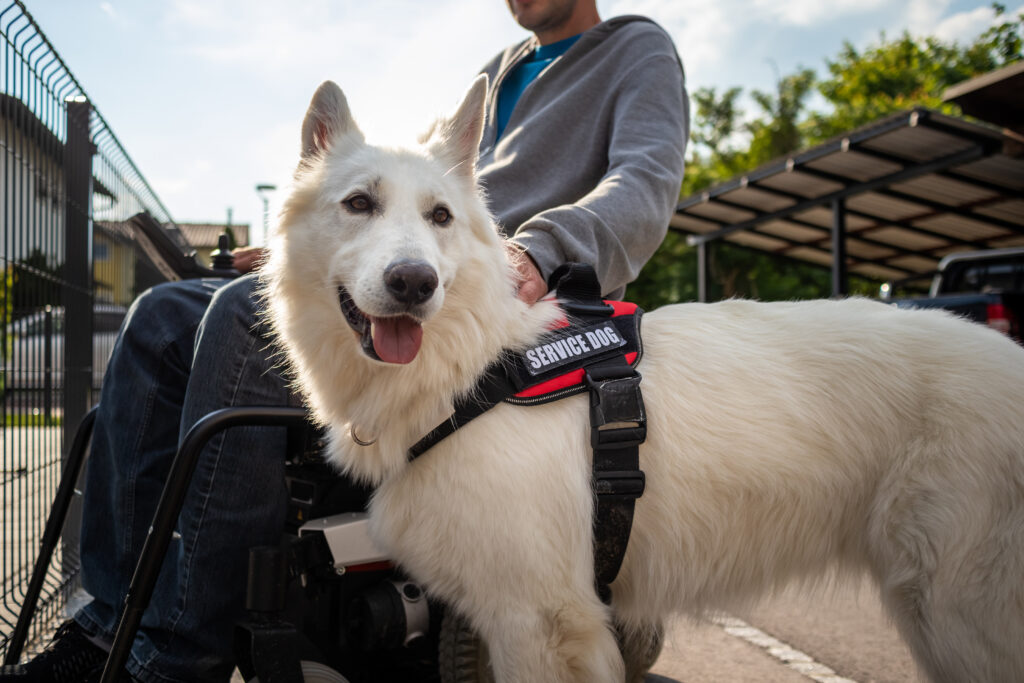
Man with disability with his service dog using electric wheelchair.
This bill was sponsored by the Wildfire Matters Review Committee of the General Assembly. Following feedback and education pointing out that service animals are an essential and connected part of mobility, accessibility and independent living for many people with disabilities, it encourages emergency management plans to address the needs of an individual with a service animal as an interdependent whole during an emergency. It would also clarify the distinction between pets and other animals versus service animals. The bill also encourages disability etiquette and service animal training to ensure emergency response personnel are prepared to interact with both individuals with disabilities, as well as individuals with disabilities who have service animals during emergency situations.
HB24 – 1067 Ballot Access for Candidates with Disabilities
This bill seeks to improve accessibility and equity by requiring that the caucusing process is accessible to all. Caucusing is when members of a political party with common views get together, and is often the place where potential candidates address the public and share their platforms. In the past, caucusing had to be done in person, which created a barrier to some potential candidates and other participants with disabilities. Further, to run for an office or get an issue on a ballot, a petition must be submitted with a minimum number of signatures. Often the petition process also requires physical presence and participation, again creating a barrier to access and inclusivity for some people with disabilities. This bill would seek to provide accommodations to allow any person with a disability to participate in the caucusing, petitioning or candidacy process, primarily by allowing video participation alongside in-person participation.
HB24 – 1165 – Denver Airport Accessibility
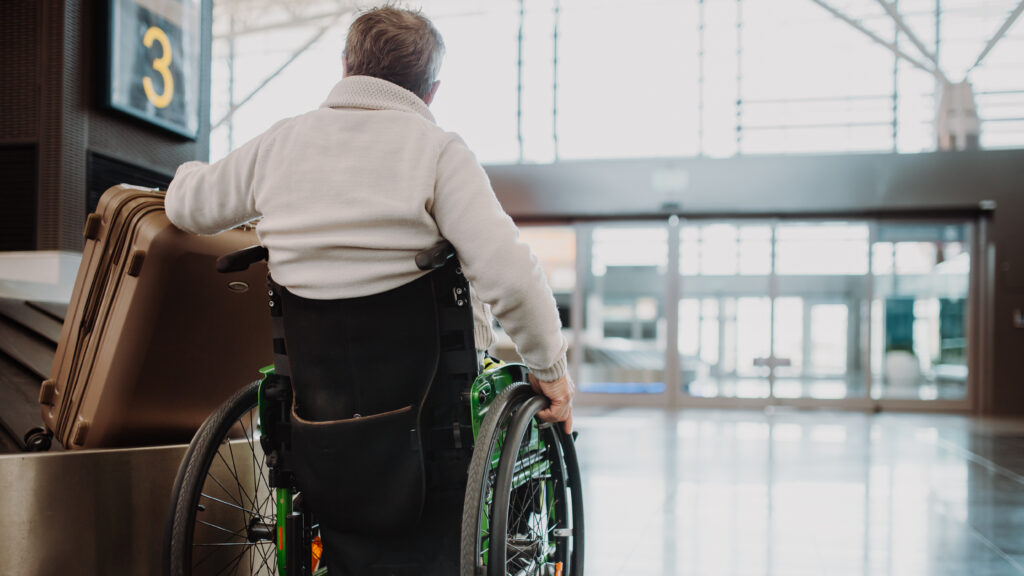
Rear view of a man on wheelchair at airport with his luggage.
The Denver International Airport (DIA) is far behind schedule on promised improvements that would increase accessibility and provide for safe handling of disability equipment such as wheelchairs. Every year, about 1% of wheelchairs used in travel are irreparably damaged by airlines, according to Rep. David Ortiz. In addition, DIA has been funded to, and committed to, improving accessibility in walkways, bathrooms, terminals, but not yet completed enough of the work satisfactorily and on time. Airlines are regulated by the federal government, so accountability for equipment damage is almost impossible, and there are currently no consequences for DIA’s delayed accessibility improvements. This bill would provide measures to ensure safer handling of equipment, and develop timelines for improvement along with consequences for non-performance. In addition, it would create a public dashboard to share complaints and concerns about accessibility and/or discrimination, as a way to bring more awareness to the problem and encourage quicker solutions.
Overview of the Day
DRAD opened with a press conference featuring Lt. Governor Diane Primavera, Rep. David Ortiz, and Andrew Romanoff, the Executive Director of Disability Law Colorado. The speakers were all in favor of increased legislation that promotes accessibility, equity and inclusion, and championed the presence of the people who came to advocate for change.
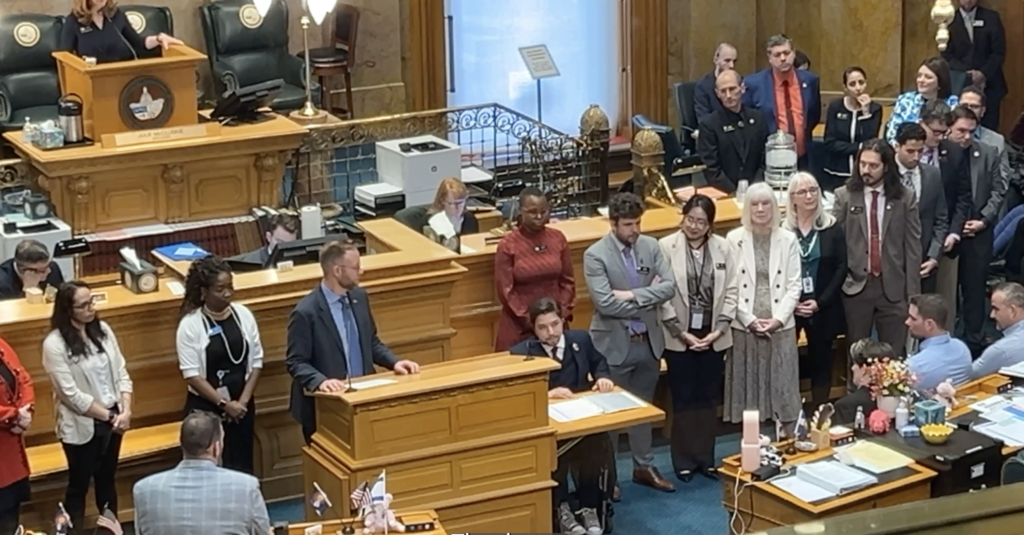
A view of the floor of the Colorado House Chambers during the passing of Resolution Recognizing & Honoring Disability Rights Advocacy Day.
Next, everyone gathered in the House Chambers where a Resolution Recognizing & Honoring Disability Rights Advocacy Day, initiated by Rep David Ortiz, was passed. Craig Towler was present on the floor of the House for this occasion, which marked progress in the acknowledgment of the rights and presence of people with disabilities not only in our communities but in our policy and lawmaking processes. Lt. Governor Diane Primavera read a proclamation stating that Governor Jared Polis and herself proclaimed March 7, 2024 Disability Rights Advocacy Day in Colorado.
Members of CPWD staff and consumers then took the opportunity to meet with Senate President Steve Fenberg’s staff to share information about CPWD’s mission and services, and talk about the importance of Centers for Independent Living for people with disabilities in Colorado. CPWD staff and Senator Fenberg staff discussed several important bills including SB25 – 065: Mobile Electronic Devices and Motor Vehicle; and HB24 – 1165: Denver Airport Accessibility. CPWD staff invited Senator Fenberg to visit CPWD offices in Boulder to learn more about CPWD and independent living.
The official rally began at 12:30pm, and featured speakers such as Carson Cotter, a board member from Arc of Colorado to speak on HB24-1161: Motor Vehicle Access Individuals with Disabilities, where he shared how challenging it is for him to use rideshare apps because they don’t report whether vehicles are adapted for wheelchairs or not.
Another speaker, Marcella Schieffelin is a parent-advocate and citizen member of the Colorado Developmental Disabilities Council. She has a daughter, Lily, with intellectual and developmental disabilities (IDD). She talked about updating the bill, SB24 – 136: Uniform Guardianship and Conservatorship to eliminate the requirement for people with disabilities to appoint legal guardianship at age 18. Rather, she argued that Supportive Decision Making in lieu of legal guardianship would be the least restrictive for people with IDD, and use best practices to support the whole person. Supportive Decision Making law is the least restrictive on the person with IDD. More info:
Many more bills were discussed, and a variety of topics and issues were brought up at the rally. We videoed portions of the DRAD activities that you can watch here on YouTube.
“DRAD is an opportunity to be informed, get involved, and have a voice in policy making,” explained Towler. “Many representatives don’t really understand how inaccessible the process of participation in legislative decisions and actions is. This being the second year in a row that we held DRAD, I think the response was really good. It’s easy to ignore one or two people with disabilities who want to bring voice to issues, but when 150 people descend upon the Capitol, it’s much harder to ignore the real needs that need to be addressed through effective advocacy and legislation.”


